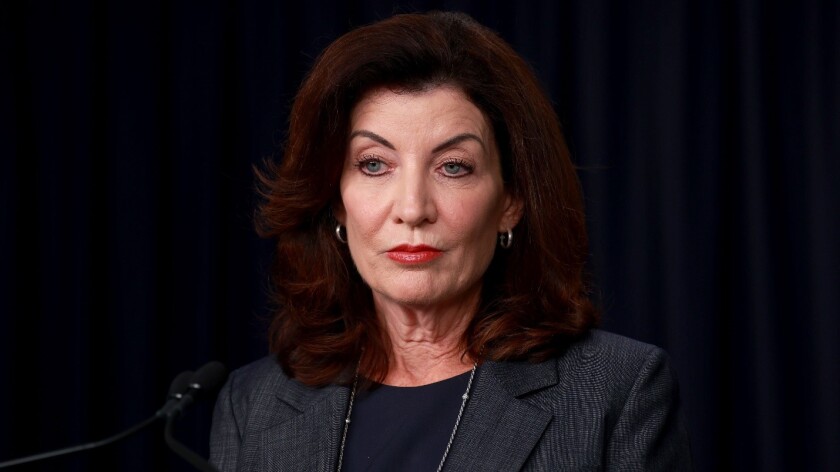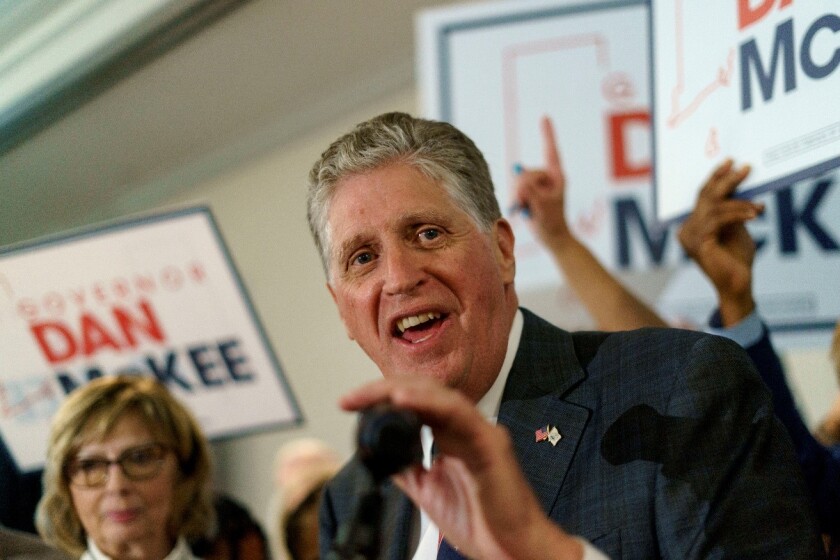New York, New York (If Dems Can Lose There…): Kathy Hochul has been around politics a long time, but she made a rookie mistake. She expected, as the Democratic governor of New York, that she would win re-election easily. That’s not a crazy assumption for someone in her position, but you still have to convince people to vote for you. Especially when you’re a semi-incumbent without a long history of support from key constituencies.
Hochul became governor last year when Andrew Cuomo stepped down amid sexual harassment allegations. Hochul moved quickly to put her stamp on the office and raised huge amounts of cash, pushing other potential Democrats, notably state Attorney General Tish James, out of the race. She must have assumed, at that point, that she was basically home free. She hardly seemed to campaign much at all, at least until her poll numbers cratered recently.
“The governor did take the race for granted,” says Kevin Parker, the Democratic whip in the state Senate. “The reality is that the base of the Democratic Party nationally, and in the state of New York, are Black and Latino women. Although the governor is a quasi-incumbent, honestly, she’s not really well known in the communities.”
Like a lot of Democrats, Hochul has limited her message largely to two issues: abortion and Donald Trump. As in other blue states, abortion has not been as animating an issue as she must have hoped, since voters feel relatively secure about reproductive rights in New York. Hochul’s Republican opponent, Congressman Lee Zeldin, did vote last year against certifying election results in other states in the wake of the Jan. 6 assault on the Capitol, but one of the lessons for Democrats last November was that running against Trump when he’s not on the ballot is not sufficient for victory.
Zeldin, by contrast, has hammered away at an issue with real resonance in 2022, namely crime. New York’s crime statistics remain historically low and aren’t dire compared to other states. Still, crime has gotten significantly worse. With New York City being the media capital of the country, horrifying incidents get outsized attention, and there has been no shortage of those, including subway killings and assaults, sometimes caught on video. Zeldin himself has been a victim of crime, assaulted at a rally last year and reporting a shooting outside his home earlier this month. Zeldin has attacked Hochul over changes to the state’s bail system and other “pro-criminal laws.”
Hochul was slow to address the issue and hasn’t fully found her footing. During their sole debate on Tuesday, she gave a tin-eared response. While trying to defend her record, she seemed to dismiss the issue’s salience, saying, “I don’t know why that’s so important to you.” On its cover Wednesday, the New York Post wrote, “Hochul says she doesn’t get why crime is so ‘important’ in gov debate.”
Parker says that the overwhelming Democratic advantage in registration will carry Hochul through to victory in the end, particularly since she is popular around her home base of Buffalo and other upstate population centers. But she won’t get the blowout she may have been expecting. And Republicans sense real opportunity. The Republican Governors Association has put $1.2 million into this race, including $500,000 just this week.

There’s no single reason Stitt is struggling, but there are a whole bunch of reasons he’s put various people off. Some are relatively small. For example, he’s never moved into the governor’s mansion, despite $2 million in renovations last year, and has been planning to raise millions in private money to build a brand-new mansion.
That resonates in terms of broader questions about financial management and sweetheart deals. A barbecue restaurant was paid $17 million after receiving a no-bid contract to operate in state parks. Top officials at a charter school company were arrested this year on racketeering and embezzlement charges in what the state auditor called the worst abuse of taxpayer funds in the state’s history. Stitt’s administration spent $8 million in federal COVID-19 funds meant for school supplies on televisions, appliances and car stereos, with the leftover dollars from the fund going to private school vouchers.
“Hofmeister is trying to make hay with rural voters around diversion of public money into private schools,” says Richard Johnson, a political scientist at Oklahoma City University. “Today was the first time I saw an ad that said to rural voters, the governor is trying to close your local schools because of his desire for public money for private education.”
Stitt’s biggest problem may be that he’s angered Native Americans. He tried unsuccessfully to renegotiate Oklahoma’s tribal gambling compact and succeeded in killing hunting and fishing compacts. His administration helped convince the U.S. Supreme Court to narrow a major ruling on tribal sovereignty issued just two years ago. Oklahoma’s five largest tribes issued a joint endorsement of Hofmeister.
“It is unprecedented that the five large tribes endorse,” says Andrea Benjamin, a political scientist at the University of Oklahoma. “They don’t usually engage in a partisan election. You have to deal with the person who wins.”
That person, more likely than not, will still be Stitt. Democrats haven’t won a statewide race since 2006 and Hofmeister would have to run well ahead of recent nominees not only in the rural areas where Republicans dominate but urban jurisdictions such as Oklahoma County. Benjamin points out that Oklahoma still uses straight-ticket voting, which means Hofmeister faces a hurdle in having to convince Republicans to make a special effort to support her and not simply pull the lever for their own party.
“It is just hard to see,” Johnson says. “The math has to work perfectly for Hofmeister to win.”

Paul Penzone, the sheriff in Maricopa County, Ariz., announced Tuesday that he’s stepping up patrols around ballot drop boxes. Last week, two armed individuals wearing tactical gear sat near a drop box in Mesa, filming voters and hurling accusations at some of them. Secretary of State Katie Hobbs, the Democratic candidate for governor, referred several complaints about intimidation and harassment to federal authorities. "Every day I'm dedicating a considerable amount of resources just to give people confidence that they can cast a vote safely, and that is absurd," Penzone said.
Nicole Griggs, a reporter covering voter intimidation in Arizona, shared on Twitter some of the threats and catcalls she’s received as a result. “So if I just happened to be standing there and put a bullet in the head of that scum reporter and then claimed it was self-defense because that scum reporter was attacking a fellow patriot I would be justified?” one person said.
The Republican National Committee and allied groups have held trainings this year in hopes of enlisting thousands of people to challenge voters. It’s not clear how many more poll watchers there will be as a result; the army of 50,000 poll watchers Trump called for in 2020 never materialized. Still, a recent state law in Georgia allows individuals to challenge other people’s eligibility and already this year thousands of voters have had to cast provisional ballots due to challenges brought by members of right-wing groups.
Across the country in Florida, a man canvassing for Republicans Sen. Marco Rubio and Gov. Ron DeSantis was assaulted and hospitalized on Sunday night. There was initially some dispute about whether the attack was political in nature, but when police arrested a second assailant on Tuesday, the report included a sworn statement from the victim stating that the assailant had told him “he couldn’t pass through because he was a Republican and his dogs were ready to attack.”
There’s a long and ugly history in America of partisan poll watchers intimidating voters, notably Black and other minority citizens. The line between intimidation and scrutiny, in the current environment, will itself be a matter of partisan debate. Officials in Houston and Harris County last week called on the Justice Department to send in federal election monitors, after the state of Texas said it would send election inspectors to the county. “These actions appear designed to chill voters’ trust in the election process in Harris County and to disrupt and intimidate local election workers,” they wrote.
Previoius Editions
-
Do cross-party endorsements signal a fracturing GOP? Plus, a Democrat may lose after half a century, how justices gain political advantage and not knowing when to say "when."
-
Why are so many candidates deciding they’re better off not debating? Meanwhile, GOP candidates struggle to raise funds, Republicans boost legislative candidates and Texas AG Paxton won’t be served.
-
This year's primary election season reached its conclusion in three Northeastern states on Tuesday and MAGA Republicans succeeded in New Hampshire. Meanwhile, state Supreme Court justices defend their own role and an intergovernmental feud heats up.
-
Democrats shouldn't count their chickens yet; what happens when election deniers run elections; and what the courts have to say.













